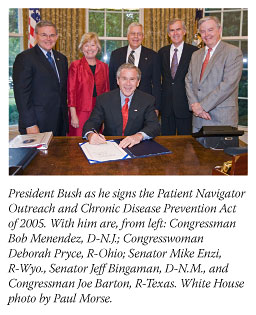|
Helping Patients Navigate the Health Care System
 A simple idea has captured the imaginations of politicians interested in making health care more accessible to all Americans: In any community, people can be trained to guide and support those who need assistance obtaining medical care. This concept is known as patient navigation, and President Bush recently approved legislation that will fund programs to increase access to health care through patient navigators. A simple idea has captured the imaginations of politicians interested in making health care more accessible to all Americans: In any community, people can be trained to guide and support those who need assistance obtaining medical care. This concept is known as patient navigation, and President Bush recently approved legislation that will fund programs to increase access to health care through patient navigators.
Signed into law on June 29, the Patient Navigator Outreach and Chronic Disease Prevention Act of 2005 authorizes $25 million in grants over 5 years to support community-based programs that train and employ patient navigators. Navigators tend to come from the communities they serve, are sensitive to cultural differences, and know how the medical system operates.
The law reflects a growing interest in using navigators to help patients who might not have access to health care or who might give up because the system is overwhelming.
NCI has been pilot testing a Patient Navigation Research Program in minority and underserved communities for the past 3 years. In the coming months NCI's Center to Reduce Cancer Health Disparities (CRCHD) will announce grantees funded under a new patient navigation program. The Centers for Medicare and Medicaid Services has also included patient navigation in a grants program totaling $25 million.
"This idea has caught on around the country," notes Dr. Harold Freeman, director of CRCHD, who pioneered the use of patient navigators beginning in 1990 while serving as director of surgery at Harlem Hospital in New York City. He determined that poor African American women with breast cancer were dying at disproportionately high rates compared with Caucasian women because they were not diagnosed early enough and lacked appropriate treatment.
Patient navigation has helped increase survival rates among African American breast cancer patients in Harlem, and the larger population was educated about cancer prevention and treatment. Today, the program, now at the Ralph Lauren Center for Cancer Care and Prevention in Harlem, includes patients screened for colon, prostate, cervix and breast cancer. A computer database helps patient navigators and physicians follow all patients and their particular needs.
If a patient has an abnormal test result, for example, that person is identified in the computer as requiring clinical follow-up. "Patient navigators can make sure there are no delays for patients who require a biopsy and treatment," says Rian Rodriguez, who supervises navigators at the Ralph Lauren Center.
A third of the program's patients have no health insurance, so navigators need expertise in helping patients with insurance issues. Navigators must also communicate effectively with patients and those involved in their treatment. Many patients in the Harlem program do not speak English and require a translator; others simply need someone who can explain what the doctor is saying in terms they can understand.
"Effective communication is essential to the success of the patient navigator program," says Dr. Freeman. "It is most exciting that the program we started in Harlem is now going to help people around the country."
By Edward R. Winstead
|